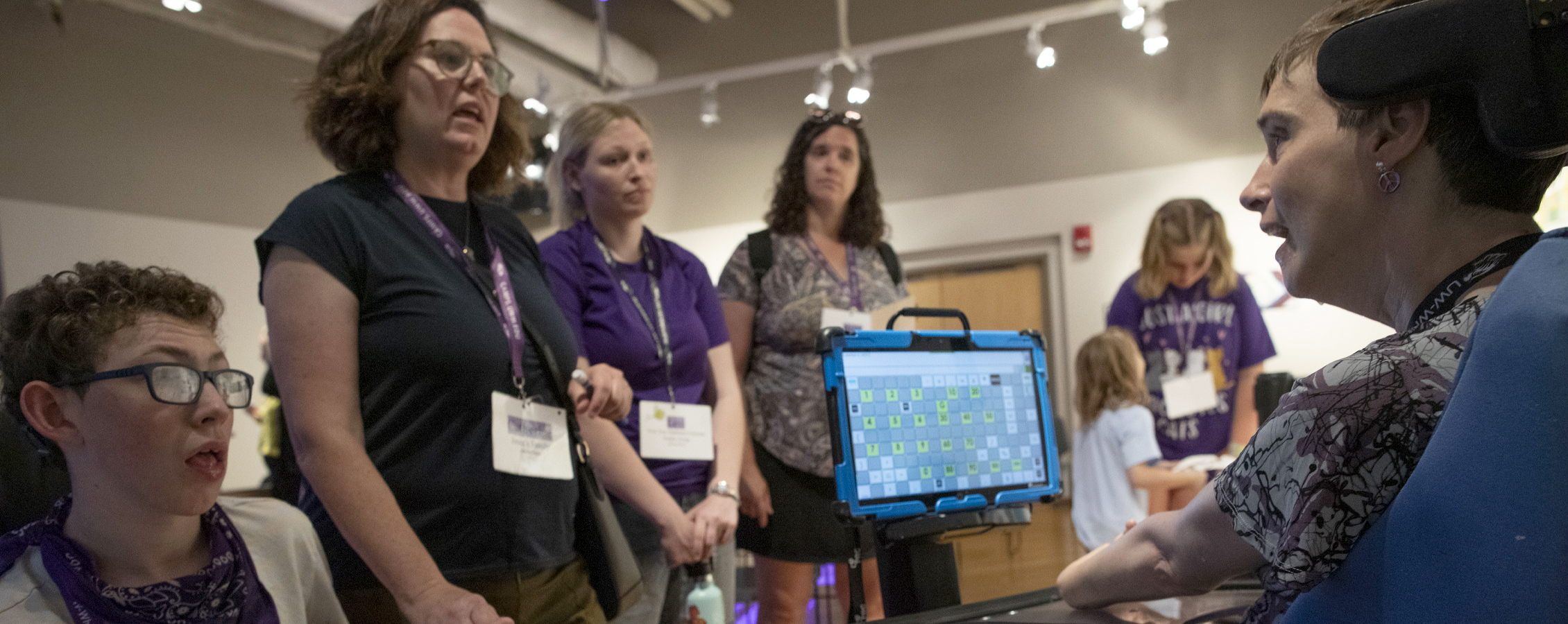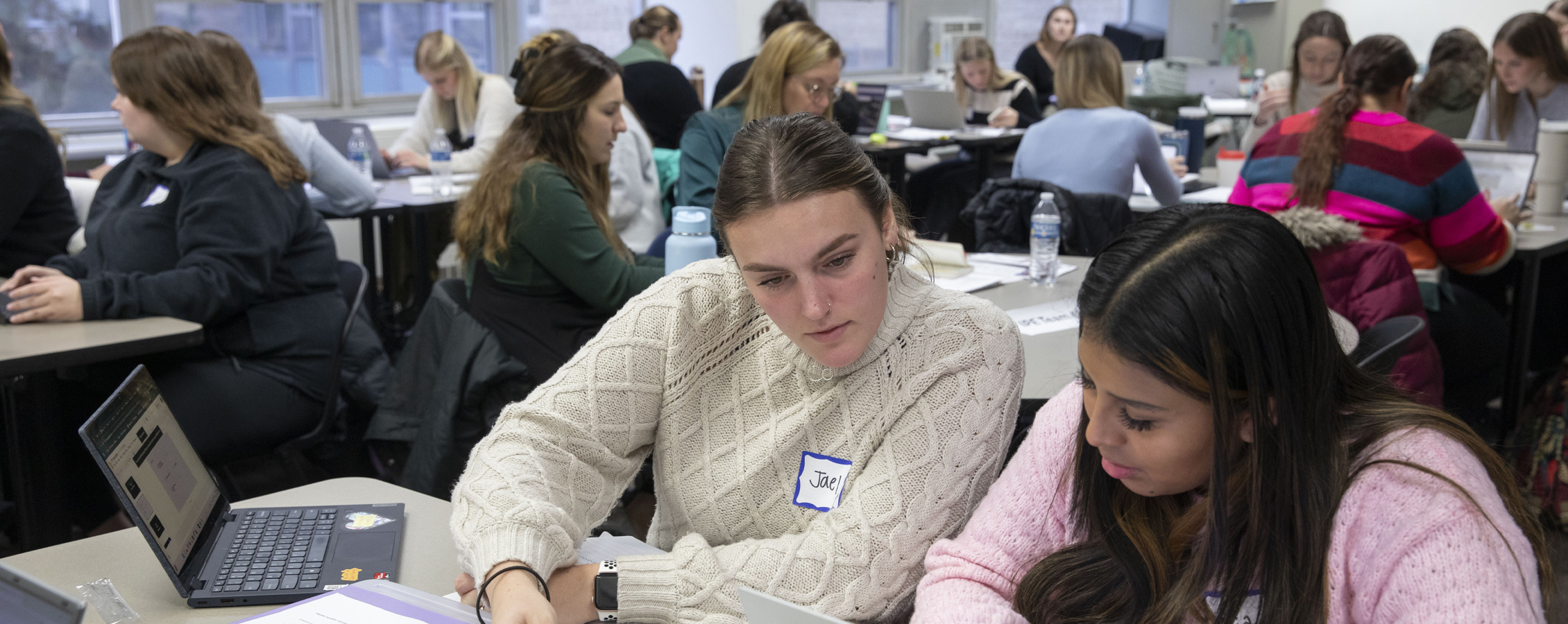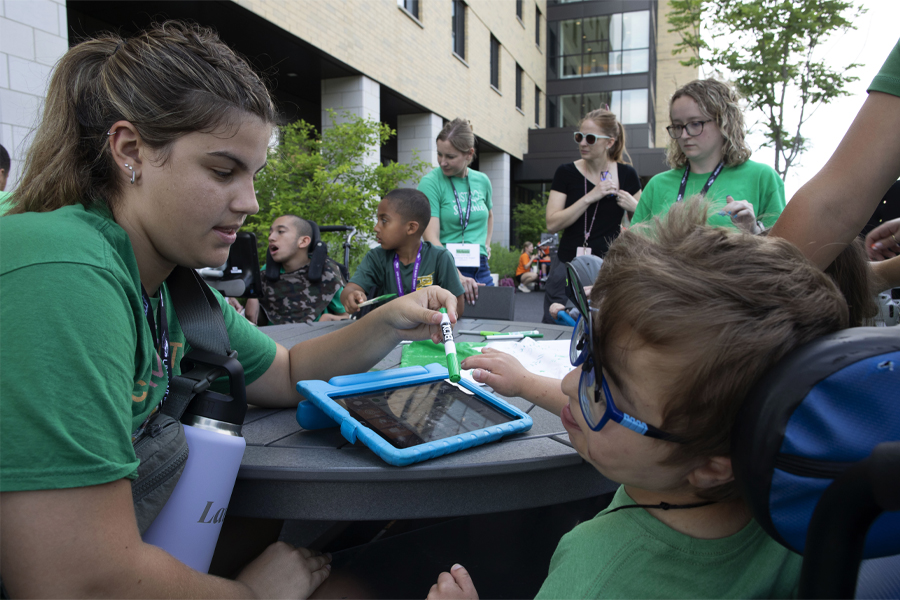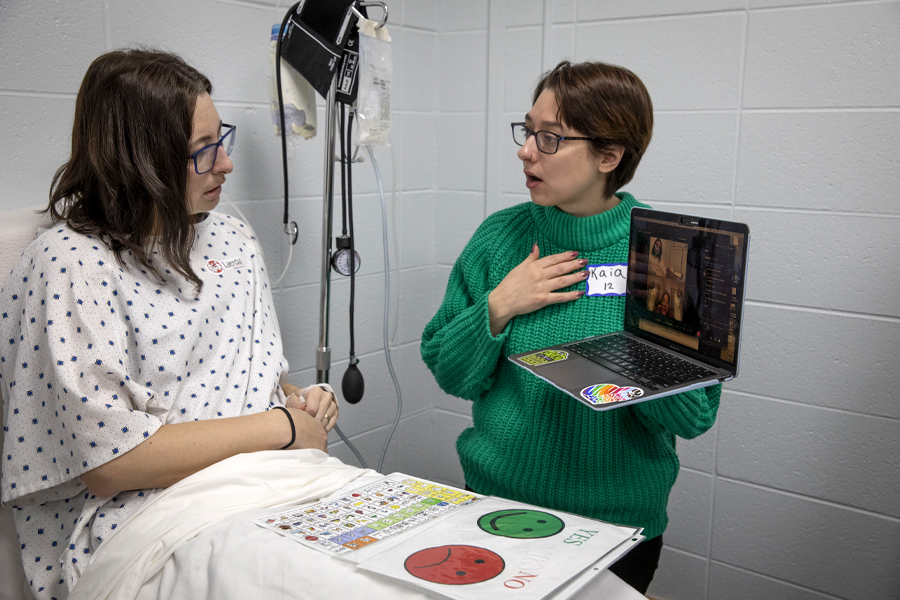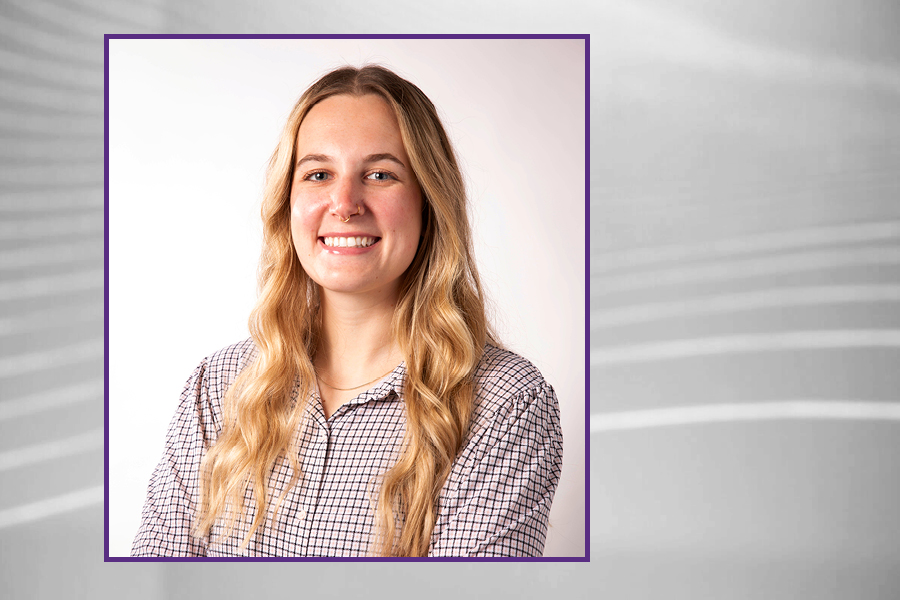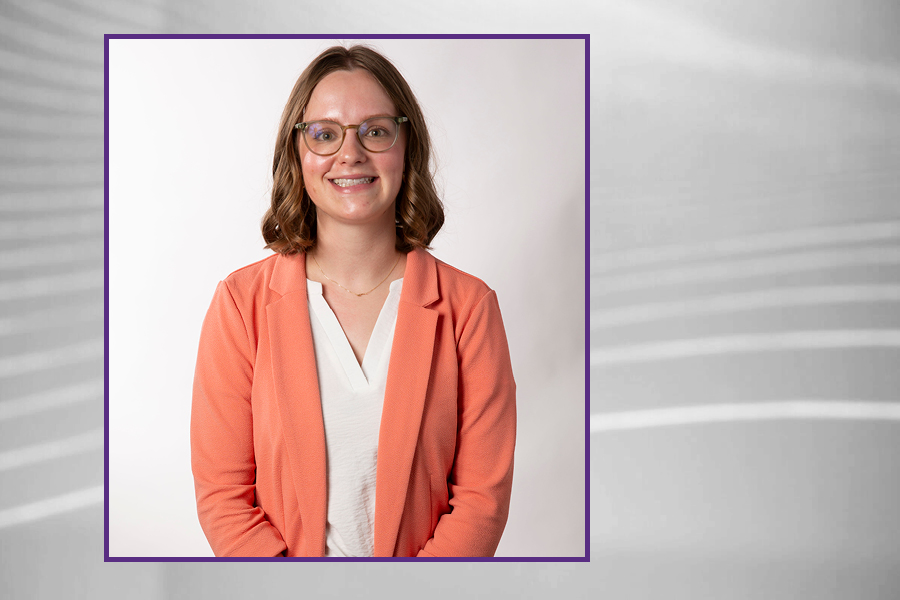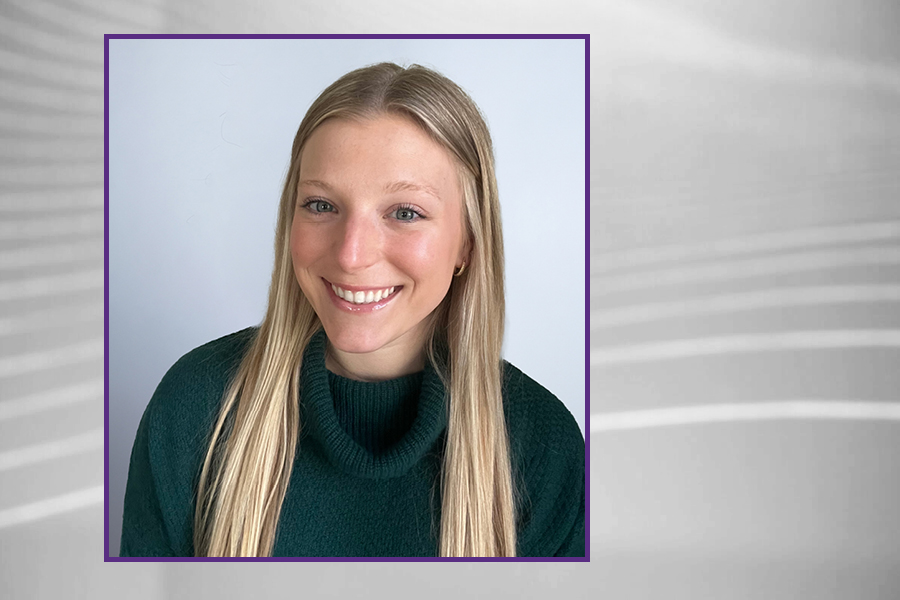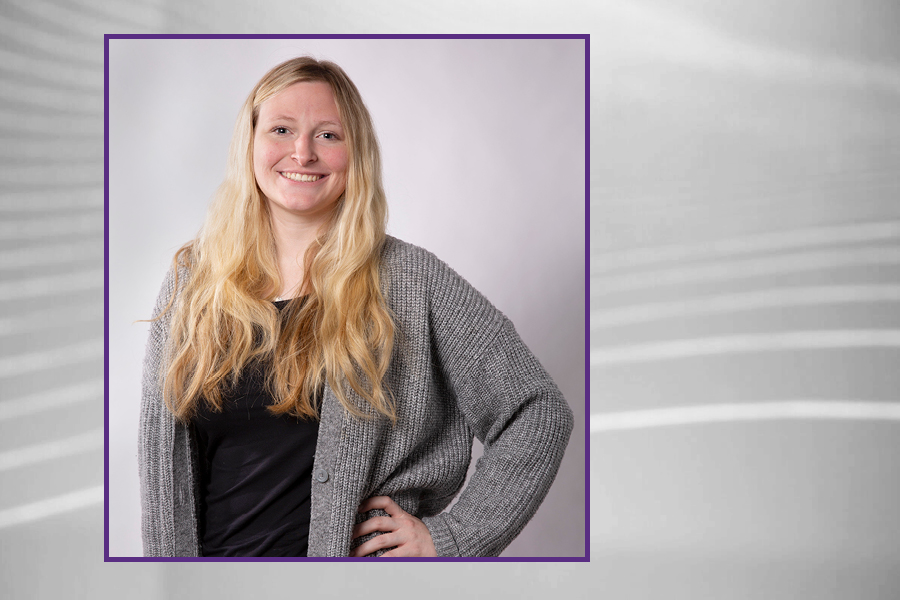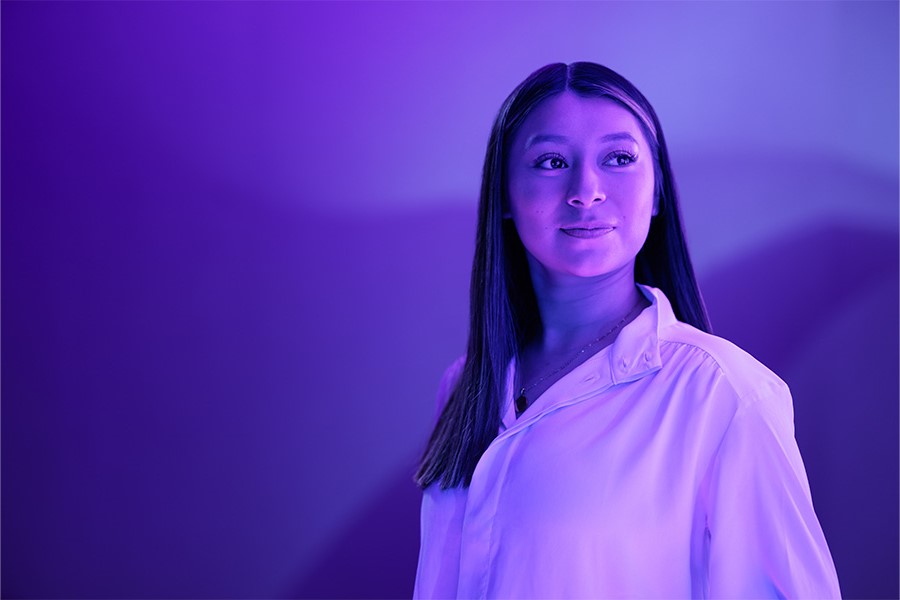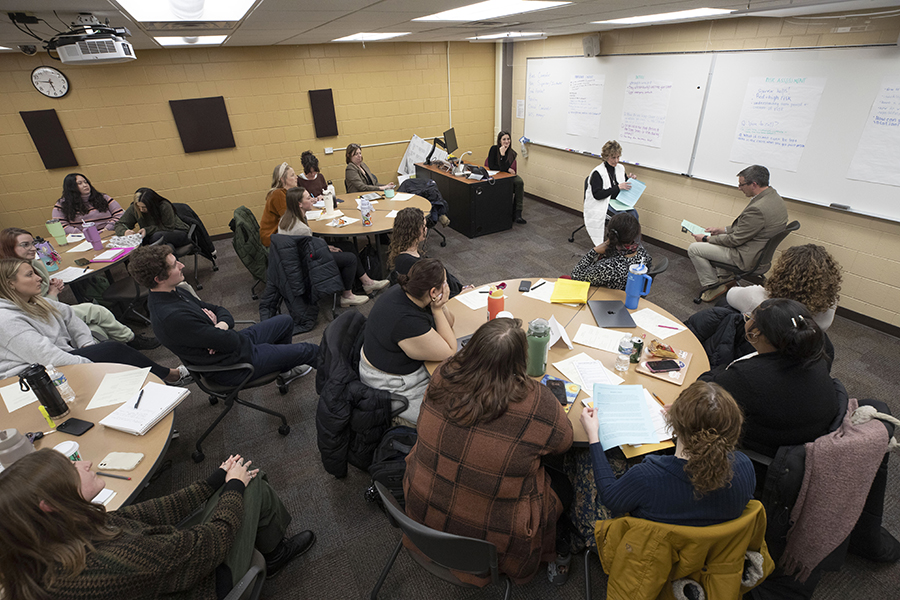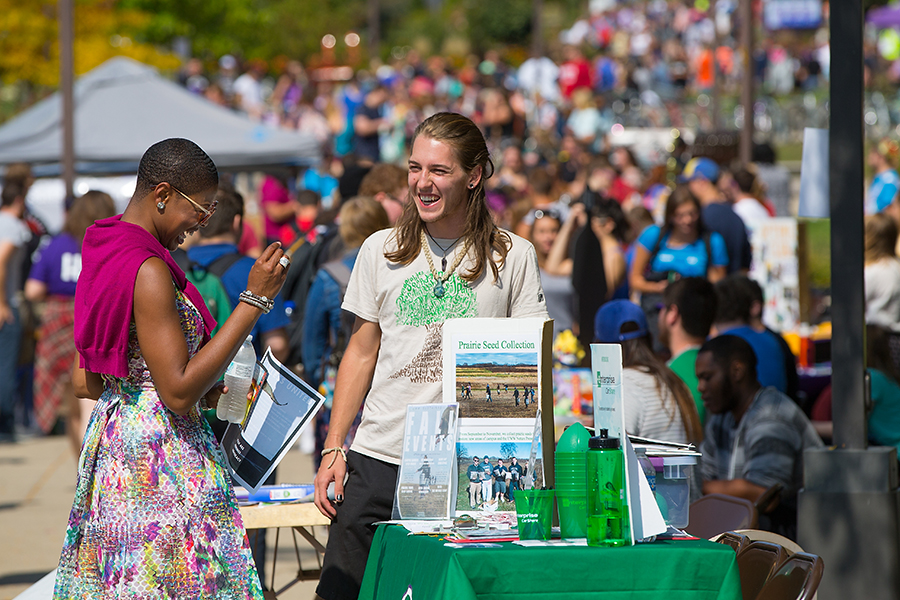COMMUNICATION SCIENCES AND DISORDERS
Master’s Degree Programs
Become a licensed speech language pathologist.
An M.S. in Communication Sciences and Disorders from the University of Wisconsin-Whitewater provides a comprehensive academic and clinical education and access to in-demand speech language pathology jobs upon completion of the program. The department provides a full-time residential comprehensive academic and clinical education program for graduate students that culminates in the requisite Master's degree for practice as a state licensed and American Speech-Language Hearing Association (ASHA) certified speech-language pathologist.
With extensive on-campus and off-site clinical experiences, students with an M.S. in Communication Sciences and Disorders from UW-Whitewater are ready to make an immediate impact on their patients. Speech language pathologists in the community use words like well prepared, competent, creative, resourceful, confident, and problem solver to describe our students.
As a small program, students have one-on-one interaction with our award-winning faculty – a quality that graduates say is one of the program’s greatest strengths.
According to the U.S. Bureau of Labor Statistics, speech language pathology jobs are expected to grow much faster than the average job. Median speech language pathology salary exceeds $80,000 per year.
CAN WE BRAG A LITTLE?
Why study Communication Sciences and Disorders at UW-Whitewater?
Hands-on, clinical experiences to prepare you for the real world
Graduate students in the Communication Sciences and Disorders program will have the opportunity to work with clients across the lifespan and with a variety of communicative disorders in the UW-Whitewater Center for Communicative Disorders (UWW-CCD). Located in the middle of the Whitewater campus, the UWW-CCD provides services to members of the community, faculty, staff, and students on campus.
The center works with several partners around campus and in the community.

An accredited program to prepare you for any role
UW-Whitewater’s M.S. in Communication Sciences and Disorders is accredited by the Council on Academic Accreditation in Audiology and Speech-Language Pathology of the American Speech-Language-Hearing Association. The program prepares students for the Clinical Fellowship (CF-SLP) that leads to the Certificate of Clinical Competence in Speech-Language Pathology (CCC-SLP).
Licensure is required in Wisconsin to practice as a speech language pathologist. The program prepares students to be licensed by the Wisconsin Department of Public Instruction (DPI) and the Department of Safety and Professional Service (DSPS). UW-Whitewater works with students individually to ensure that students meet licensure requirements in their location.
Questions regarding the transfer of UW-Whitewater’s school-based licensure programs to other states should contact the College of Education and Professional Studies licensure department at coepslicensure@uww.edu.
Additional information can be found on UW-Whitewater’s professional licensure disclosure page. An overview of other states’ requirements can be viewed through the ASHA web page.
What our Communication Sciences and Disorders students do
Financial considerations
Costs
- Graduate Assistantships (Note: The February 15 deadline is one month before the Communication Sciences and Disorders program acceptances are distributed, so graduate students may not learn if a GA position is available and offered until mid-April.)
- Financial aid for graduate students
- Scholarships for graduate students
Where our graduates go
Careers: What can you do with an M.S. in Speech Language Pathology?
In addition to the areas listed above, many of our speech-language pathologists land in administrative or director roles in schools, hospitals, or private practice.
License fluidity: Practice where you want
While a number of our students come to UW-Whitewater from places in close proximity to campus and our licensing is specific to Wisconsin, we support students who want to be licensed out of state. Communication sciences and disorders faculty have successfully assisted students who want to practice in other areas of the country.
The table below outlines student outcomes, including program completion rate, Praxis exam pass rate, and the number of graduates employed within one year of receiving their degree.
| Academic Year | Number Completed on Time | Number of Completed After than on Time | Number Not Completed |
|---|---|---|---|
| 2022-23 | 12 | 0 | 2 |
| 2023-24 | 16 | 0 | 0 |
| 2024-25 | 13 | 0 | 0 |
| 3 Year Average | 95% Completion Rate |
Praxis Examination Pass Rates of Graduates
*Praxis Test is required for Licensure
| Academic Year | Number Taking Exam | Number Passed Exam | Praxis Pass Rate |
|---|---|---|---|
| 2022-23 | 12 | 12 | 100% |
| 2023-24 | 16 | 16 | 100% |
| 2024-25 | 13 | 13 | 100% |
Employment Rates of Graduates within One Year of Graduation
| Academic Year | Number of Graduates | % of Graduates Employed |
|---|---|---|
| 2022-23 | 12 | 100% |
| 2023-24 | 16 | 100% |
| 2024-25 | 13 | 100% |
Our Communication Sciences and Disorders faculty
The vision of the Communication Sciences and Disorders graduate program is to be recognized regionally and nationally for its exceptional clinical education program and its dedicated network of faculty, clinical instructors, and alumni. The mission of the graduate program is to prepare speech language pathologists to practice across the lifespan and all settings, particularly in the southeastern region of Wisconsin. Specific objectives include:
- To prepare highly qualified professionals in speech language pathology who exceed the guidelines of the American Speech-Language Hearing Association (ASHA) for clinical and academic preparation;
- To prepare speech language pathology professionals to assess, diagnose and treat clients of diverse cultural and linguistic backgrounds; and
- To act as a resource for the university and community by serving as consultants, facilitators and authorities in the various areas of communication disorders.
Want to learn more about the M.S. in Communication Sciences and Disorders graduate program? comdis@uww.edu | 262-472-1301
Graduate program director: Lynn Gilbertson | 262-472-5203 | gilbertl@uww.edu
UW-Whitewater offers the following graduate Communication Sciences and Disorders degrees:
The M.S. in Communication Sciences and Disorders program at UW-Whitewater begins admitting students for the following academic year on July 15. The application deadline is February 1, and applicants will be notified in mid-March concerning their status. The program begins the third week of August.
An undergraduate degree in Communication Sciences and Disorders is not a prerequisite for admission, but students must successfully complete requisite pre-graduate course work. Students should provide official transcripts documenting the completion of the prerequisites to be enrolled in the graduate program.
Post-baccalaureate certificate:
This is an online specialized course sequence that typically can be completed in one year, allowing a student with a bachelor's degree in another field to prepare for application to a master's degree program in speech-language pathology. Learn more about this program »
The following prerequisites are courses that if not completed prior to entry into the graduate program can be completed at the graduate level in addition to the required master’s program courses. A student cannot have more than three credits of prerequisites needed in any one semester. Adding prerequisites to the full-time master’s program will likely require students to incur additional fees for overload credits and may extend time to degree.
- Physics/Chemistry — Physical science must be met through chemistry or physics only. Coursework in physical sciences cannot be related to speech language pathology, audiology, or communication sciences.
- Biology — The study and characterization of living organisms and the investigation of the science behind living things. Coursework in biological sciences cannot be related to speech-language pathology, audiology, or communication sciences.
- Social Science — The systematic analysis and investigation of human and animal behavior. Coursework in social sciences cannot be related to speech language pathology, audiology, or communication sciences.
- Statistics — A stand-alone course in statistics is required. Research methodology courses in communication sciences and disorders may not be used to satisfy this requirement.
- Education/Diversity — A course designed to prepare students to understand school settings with diverse populations with attention directed to major educational issues, the experiences of students from diverse backgrounds, and the role of the teacher in a pluralistic society.
- Anatomy and Physiology of Speech & Non-Speech Functions — A course that provides foundational understanding of the anatomy and physiology for speech and non-speech functions such as respiration, phonation, articulation, expression, and swallowing.
- Speech and Language Development — A course that covers the process and sequence of speech and language development in children from birth to school-age and discusses the theories of language acquisition and the role of cognition, culture, context, and caregivers.
- Language Disorders in Children — A course designed to provide students with an overview of language disorders in children, from birth to adolescence. This course will include the nature of developmental language impairments, causes of language impairments, and other issues involved in assessment and intervention for children with language disorders.
- Hearing and Speech Science — A study of the anatomy and physiology of the auditory system, physical acoustics, speech production, sound perception, and basic hearing and speech instrumentation.
- Phonetics — A course that provides a basic understanding of phonetics and phonology from articulatory and physiological perspectives and trains students to use the International Phonetic Alphabet (IPA).
- Neural Bases of Cognition, Communication, & Swallow — A course that provides a basic understanding of the neuroanatomy and neurophysiology underlying cognition, communication, and swallowing (both typical and atypical processes).
- Introduction to Clinical Practicum/Clinical Observation — An introduction to the tasks and related competencies associated with clinical practice in speech-language pathology and developed an understanding of treatment principles and clinical practice procedures. Obtain 25 guided observation hours.
- Hearing Health & Assessment/Audiometry — A course designed to provide foundational knowledge of the audiology profession, typical characteristics and etiologies of the auditory system, standard hearing assessments and interpretation, and hearing conservation practices.
For more information, visit ASHA’s Prerequisite Course Content Areas Related to SLP Certification Standards.
The program wants students to be aware that multiple external sites (i.e., practicum sites, schools, clinics, etc.) require documentation (vaccines, TB skin test, criminal background check, etc) that the university does not require to enroll as a student. These are required placements. Therefore, you may be required to submit proof of vaccination, etc. If you do not, you may not be able to participate due to the sites’ requirements. Without the required placements, you will not be able to complete the program. UWW cannot exempt a student from a requirement another organization may have. We cannot guarantee that a student without requested placement documentation will be able to complete the program because the program requires three external clinical placements. Our program cannot dictate the requirements for participation at external locations.
The University of Wisconsin-Whitewater is committed to inclusion and belonging as universal human rights in every aspect of our institution. Our commitment drives continued growth and development as an institution widely recognized for inclusive excellence and equity-minded, high-impact educational practices and experiences. We create learning and working environments for all people by enriching the quality of daily life and preparing them to serve the university, the community, the State of Wisconsin, and the world. - UW-Whitewater's Statement on Inclusivity
Students will be serving a vibrant community in our campus and external clinics. All clinical practicums are required to complete the program. You can find a list of our current campus clinic services and partnerships at our clinic webpage.
Applications are accepted exclusively through the graduate application portal.
Preparation for materials for submission includes the following:
- Term selection: Graduate Fall
- Program selection: Communication- Sciences and Disorders (MS)
- Personal Background: Name, Addresses, Biographical Infromation, Citizenship
- Additional Infromation: Birth info, Family & Educational Background, Gender Identity, Ethnicity, Race
- Residency
- Academic History: All college/post-secondary institutions official academic transcripts
- Employment
- Communication Sciences and Disorders Department Requirements
- Background check
- Personal statement:
- In 250 words or less, describe with specific examples your unique skills, interactions, and experience(s) that will support your academic and clinical success
- In 250 words or less, describe the strategies you utilize to overcome a barrier or challenge
- In 250 words or less, describe a course in your academic career and how you would apply what you learned to clinical situations
- Resume
- Communication Sciences and Disorders coursework GPA
- Sufficient coursework background: List all completed and pending relevant prerequisites
- Recommendations: Three letters of recommendation attesting to your ability to perform at a graduate level
*Note that the Graduate Record Examination (GRE) is not required for applying to the program.
Questions concerning the electronic application process should be directed to grad@uww.edu.
Criteria for application to be reviewed
- Applications are only accepted electronically through the graduate application portal.
- The application deadline is February 1. Applications must be completed by 10:59 p.m. Central Time on the deadline date. Applications can only be completed once all information, payments, background checks, transcripts, and letters of evaluation have been received. To ensure your application is completed on time, try to complete your application at least four weeks before the deadline.
- All applications that are completed by the deadline are reviewed.
Review Process
Each application is assigned to two reviewers from the department review committee who will independently conduct a holistic review of all the candidate’s submitted materials. This review takes into consideration applicants' experiences, attributes, academic metrics, and references as well as the value an applicant may contribute to learning and practice.
Candidate Notifications
Students will receive one of three emails from the program by March:
- Accepted: The acceptance invitation is only valid until the date specified or until the cohort is filled, whichever is sooner.
- Waitlisted: In no way does being on the waitlist mean that a student is not well suited for the program. See our graduate program applicant characteristics for more details. Candidates receiving a waitlist notification need to complete a survey indicating if they wish to remain on the waitlist. Candidates who indicated they wanted to remain on the waitlist will be invited, in order, until the cohort is filled. We do not disclose the order of the waitlist because it is always changing. Acceptance letters have gone out as late as mid July. It all depends on when we fill our cohort and if those that accepted the invitation fully commit to the program. Candidates receiving a waitlist letter need to complete a survey indicating if they wish to remain on the waitlist.
- Declined: Students who receive a decline letter will receive no further notification from the department for the current application cycle.
- Department Graduate Assistantships (GA position)
- The department typically offers two 1-year only, 14 hour/week graduate assistantships to students in the incoming cohort.
- The department GA positions are by invitation only.
- There are other GA positions on campus and students are encouraged to apply for consideration.
- Out of State Excellence Awards
- Typically the graduate school provides excellence awards that the department offers to the top out of state students who have received an acceptance letter but not yet committed to the program.
- Out of state students offered this award can receive a tuition credit for 4 full-time semesters (excluding summer) as long as they maintain good standing (GPA of 3.5 or higher). The credit cannot reduce out-of-state tuition below the cost of in-state-tuition.
The Master of Science (M.S.) education program in speech language pathology {residential} at the University of Wisconsin-Whitewater is accredited by the Council on Academic Accreditation in Audiology and Speech-Language Pathology of the American Speech-Language-Hearing Association, 2200 Research Boulevard, #310, Rockville, MD 20850, 800-498-2071 or 301-296-5700. The program prepares students for the Clinical Fellowship (CF-SLP) that leads to the Certificate of Clinical Competence in Speech-Language Pathology (CCC-SLP).
Graduate program applicant characteristics
The table below shows characteristics of students admitted to the UW-Whitewater M.S. in Communication Sciences and Disorders program over the last three years. It includes undergraduate grade point average considerations, percentage of applicants admitted to the program, and percentage of admitted students who enroll.
| Year | # of Applicants | # Offered Admission | Overall GPA of those Offered Admission | Major GPA of those Offered Admission | # Admitted |
|---|---|---|---|---|---|
| 2023 | 200 | 74 | 3.80 | 3.90 | 15 |
| 2024 | 175 | 51 | 3.80 | 3.90 | 16 |
| 2025 | 149 | 43 | 3.81 | 3.95 | 16 |
| Academic Year | Admit Rate | Yield Rate |
|---|---|---|
| 2023 | 37% | 20% |
| 2024 | 29% | 31% |
| 2025 | 29% | 37% |
Admit Rate: % calculated as # of students offered admission divided by the # of applicants
Yield Rate: % calculated as # of students admitted divided by the # of students offered admission

